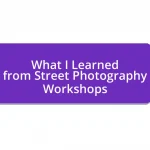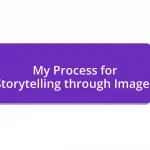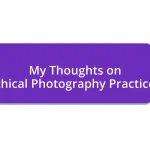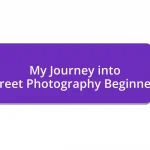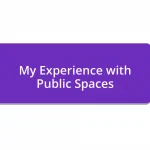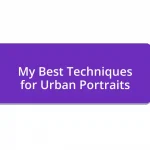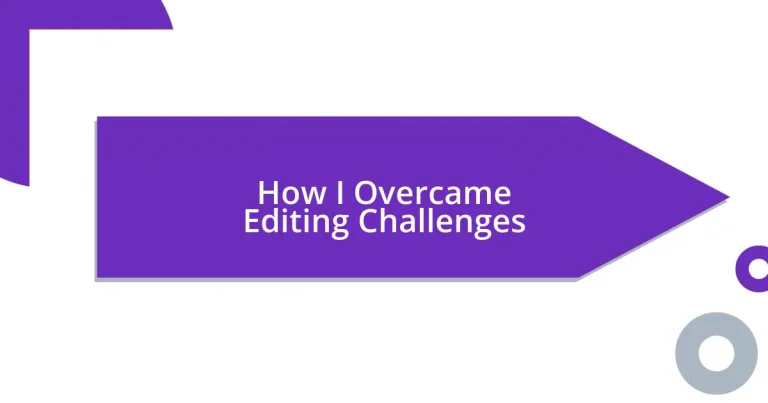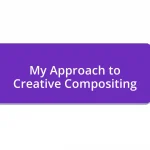Key takeaways:
- Self-editing can be emotional; embracing vulnerability helps in recognizing areas for improvement.
- Identifying specific issues in writing—like structure, pacing, and clarity—can lead to more effective edits.
- Utilizing strategies like taking breaks, reading aloud, and seeking feedback are essential for enhancing the editing process.
- Reflecting on one’s editing journey reveals growth and a deeper appreciation for writing as a craft.
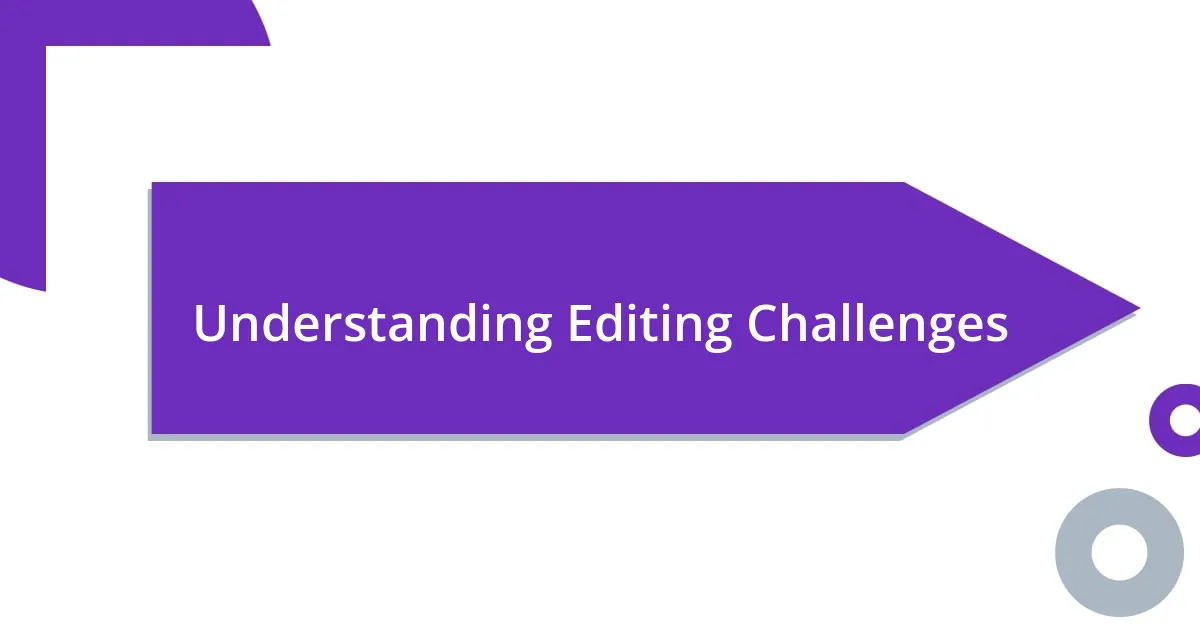
Understanding Editing Challenges
Editing challenges can feel overwhelming at times, especially when you’ve poured your heart into a piece. I remember sitting for hours, grappling with how to make my voice shine through while also polishing the text to flow seamlessly. Have you ever felt like you were walking a tightrope between artistic expression and technical precision? That was my experience.
One of the most significant hurdles I faced was the dreaded self-editing phase. The first time I tried to critique my work, it felt like examining my own reflection—both enlightening and painful. I often wondered, “Am I being too harsh on myself?” Embracing vulnerability within that process helped me become more objective about my writing.
Sometimes, I found that the toughest edits were those that involved cutting beloved sections. It tugged at my heartstrings to slice away paragraphs I thought were brilliant but ultimately didn’t serve the piece. This taught me that clarity and purpose should always reign supreme over sentimentality. Do you resonate with that feeling of attachment to your writing? It’s a common struggle, but, in the end, it’s about serving the story.
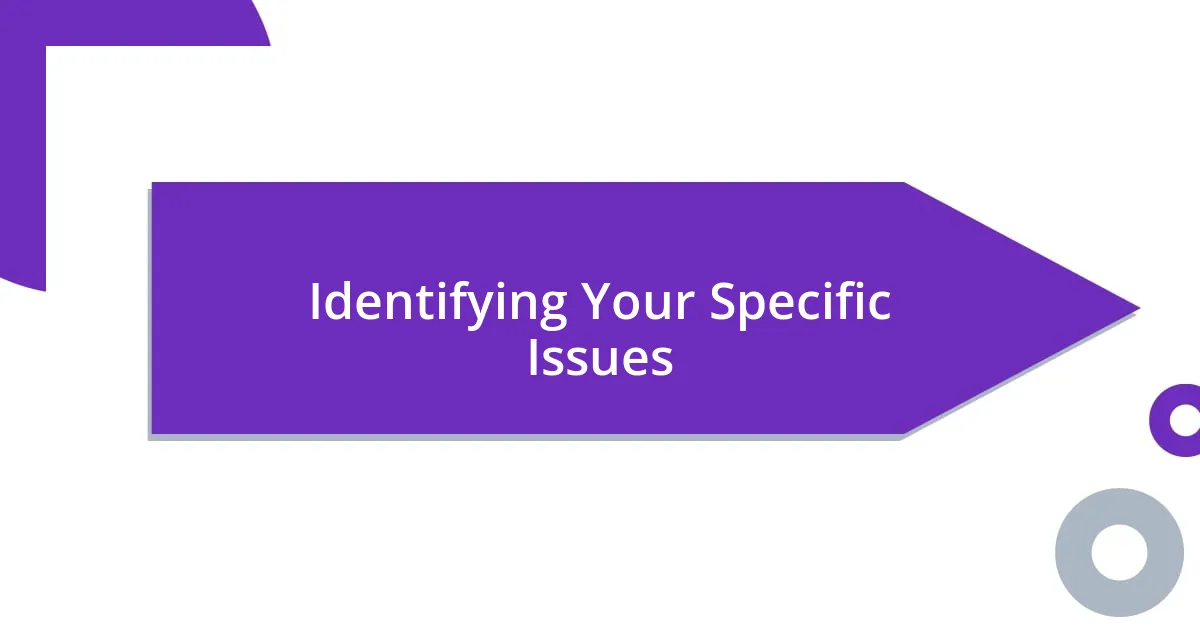
Identifying Your Specific Issues
Identifying the specific issues in your writing can be a revelation. I remember the first time I recognized that my edits often stemmed from different sources. It wasn’t just about grammar or clarity; deeper issues were at play. Understanding if I’m wrestling with structure, pacing, or even character development changed my entire approach. Once I began to pinpoint these problems, it felt like lifting a weight off my shoulders.
Here are some areas to consider when identifying your editing challenges:
- Structure: Am I losing the reader with a confusing arrangement of ideas?
- Pacing: Is my narrative dragging, making readers lose interest, or rushing through key moments?
- Voice: Does my personality shine through, or am I sounding more like a textbook?
- Clarity: Are my ideas clear, or do they need more explanation?
- Emotion: Am I evoking the feelings I want in my audience, or is the text falling flat?
By asking these questions, I discovered that my editing challenges often reflected deeper insecurities in my writing journey. Recognizing these allowed me to approach each draft with new awareness and focus.
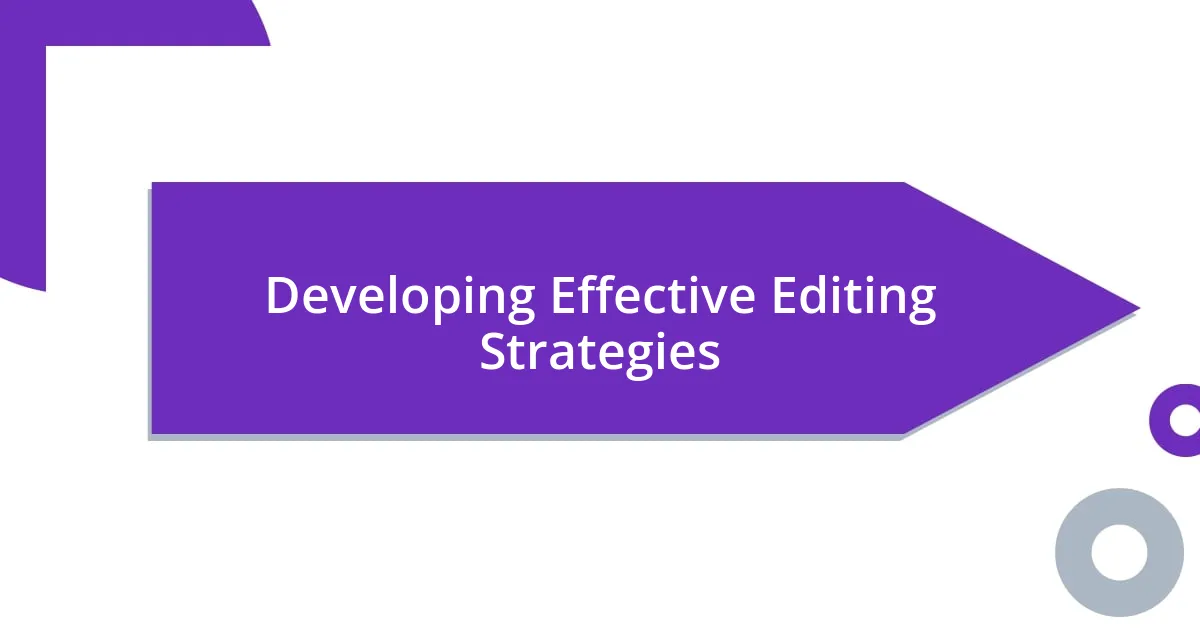
Developing Effective Editing Strategies
Developing effective editing strategies requires a shift in perspective. In my experience, approaching editing as an opportunity to enhance rather than critique transformed my process. I learned that creating a dedicated editing space—comfy chair, a cup of tea, and even soft background music—helped me feel at ease, allowing my thoughts to flow freely as I navigated corrections.
Two strategies that have significantly improved my edits are the “time away” technique and reading aloud. When I let my work breathe for a day or two, I often return with fresh eyes, spotting errors and awkward phrasing with ease. Reading aloud immerses me in the rhythm of my writing, allowing me to hear where it stumbles. Have you ever noticed how your writing sounds completely different when spoken? This strategy can reveal issues hidden during silent reading.
Lastly, collaborating with fellow writers or using beta readers can offer invaluable insights. I vividly recall sharing an early draft with a friend who pointed out inconsistencies I had overlooked. Her gentle critique opened my eyes to the importance of outside perspectives in shaping a strong narrative. After all, we often see our writing through a biased lens, making external feedback crucial for growth.
| Editing Strategy | Description |
|---|---|
| Time Away | Stepping back from the draft to gain fresh perspective |
| Reading Aloud | Listening to the text helps identify flow issues |
| Collaborative Feedback | Sharing with others provides new insights and perspectives |
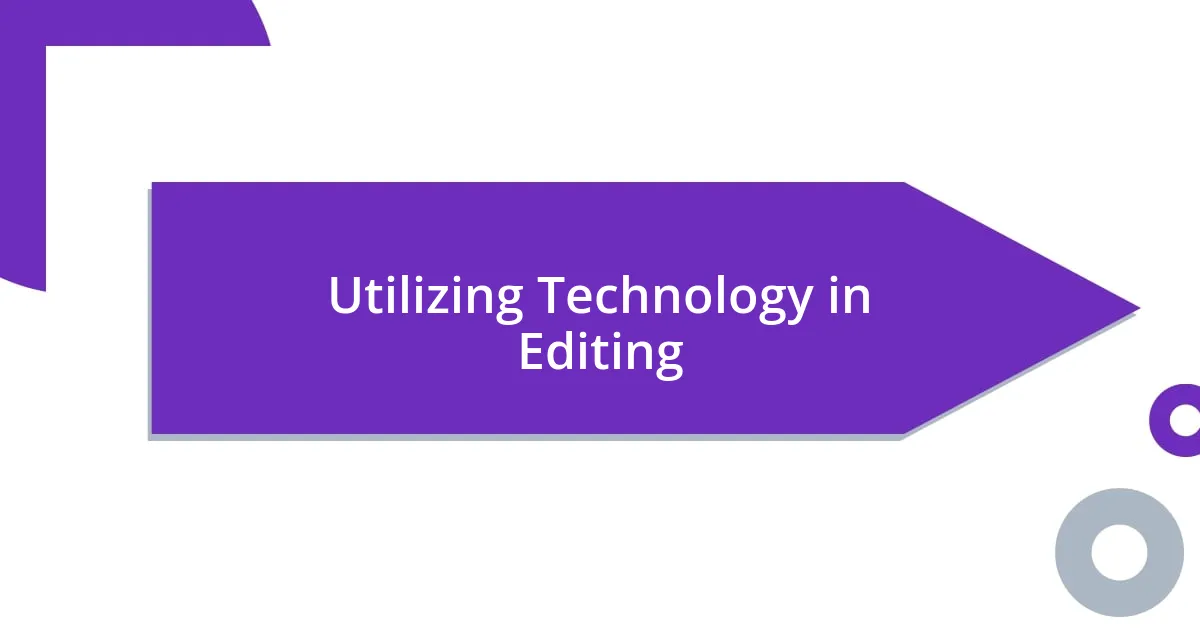
Utilizing Technology in Editing
Utilizing technology in the editing process has been a game-changer for me. I vividly recall the first time I used editing software; it felt like having a seasoned co-pilot by my side. Tools like Grammarly and ProWritingAid helped me catch pesky grammar errors and suggested style improvements that I might have missed. It was astonishing to see how a simple click of a button could illuminate issues in my writing that I hadn’t noticed, turning a daunting task into a more manageable one. Have you ever felt overwhelmed by edits? These tools can lighten that burden significantly.
Beyond grammar checks, I’ve discovered the power of organization software like Scrivener. When I began using it, I was shocked at how easily I could rearrange sections of my work. Have you ever struggled with the flow of your narrative? Scrivener’s corkboard feature allows me to visualize my story’s structure, making it easier to see where adjustments are needed. This kind of clarity was something I desperately sought, and it added a layer of confidence to my editing sessions.
Lastly, I can’t stress enough how invaluable cloud-based collaboration tools have become. When I share my drafts with friends or fellow writers through Google Docs, I get immediate feedback in real-time. Those moments of receiving a notification that someone has left a comment can be exhilarating! It lifts my spirits knowing that my work is resonating with others. Plus, the ability to see different perspectives enriches my writing. Have you tried collaborating this way? Embracing technology has made my editing feel less like a solitary chore and more like a communal experience, which I find incredibly fulfilling.
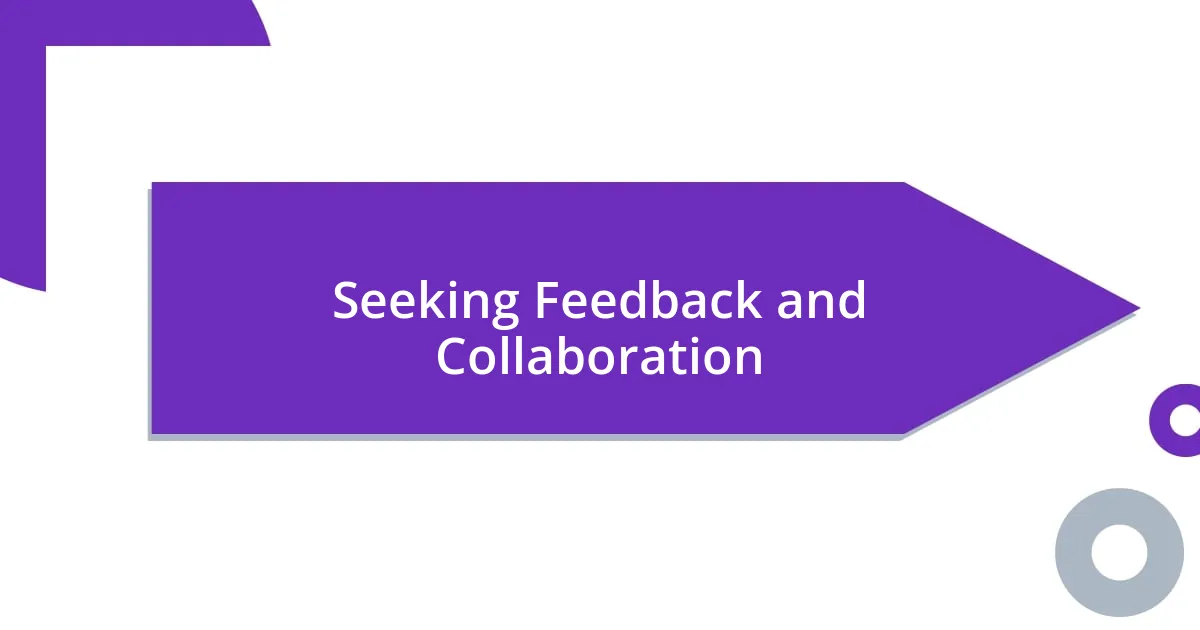
Seeking Feedback and Collaboration
Seeking feedback can sometimes feel intimidating, but I’ve learned that it’s a vital part of my editing journey. I remember when I nervously sent my manuscript to a writing group for the first time. Their responses were eye-opening. One member noted a character’s motivation that felt weak to her, something I had overlooked, assuming everyone would automatically understand it. This experience made me realize just how essential it is to have diverse perspectives on my work.
Collaboration, on the other hand, has been like adding spices to a bland dish—transformative and sometimes surprising. I frequently reach out to a close friend who writes in a different genre, and her fresh eyes uncover elements I didn’t even realize needed changing. It’s fascinating how a simple exchange of ideas can spark inspiration. Have you ever had a conversation about your work that led to a breakthrough? It’s this collaborative energy that fuels my creativity and pushes my writing beyond my own limitations.
There’s something inherently fulfilling about receiving feedback after sharing your work. When I get those comments and praises, I feel a rush of validation, knowing my effort is appreciated. Conversely, constructive criticism can sting, but I remind myself that every piece of feedback is a stepping stone toward improvement. It keeps me grounded and encourages growth. Have you felt that mix of excitement and anxiety when sharing your drafts? It’s a powerful reminder that we are all learning together in this vast world of storytelling.
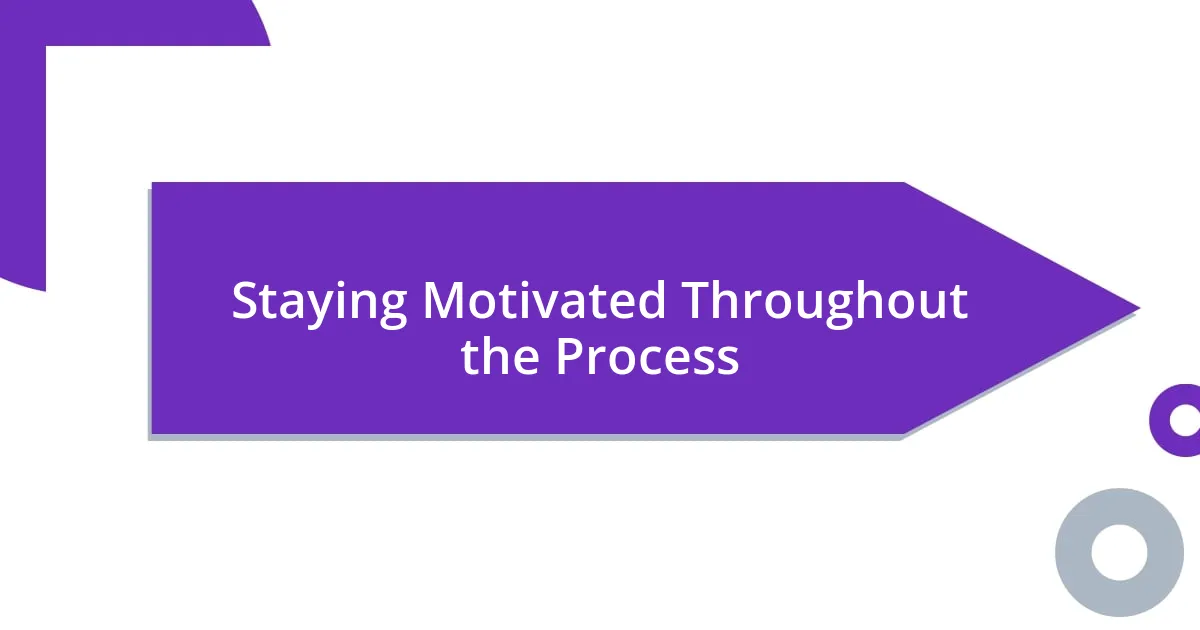
Staying Motivated Throughout the Process
Staying motivated during the editing process can be quite a challenge. I find that setting small, achievable goals helps keep my momentum going. For example, I often aim to edit just one chapter or focus on one specific aspect, like character development. It’s amazing how checking off those smaller goals can boost my spirits and make the editing phase feel less overwhelming. Have you ever found motivation in breaking tasks down?
I also lean heavily on the power of routine. I’ve discovered that dedicating specific time slots each week for editing keeps me engaged and helps me stay accountable. There was a time when I allowed distractions to sidetrack me, but establishing this routine transformed my workflow. I now treat these sessions as appointments with myself—something I look forward to, like meeting a friend for coffee. Does creating a consistent schedule resonate with you, too?
Emotional highs and lows are part of the editing journey. I remember moments where I felt frustrated by lengthy revisions, but celebrating the progress I made, even if it was just a few paragraphs, became crucial. Sharing those little wins with friends or writing community members not only boosted my motivation but also reminded me that editing is a collaborative endeavor. How do you celebrate your own victories during this process? Recognizing the importance of these small milestones keeps the fire of motivation alive for me, leading to a more positive editing experience.
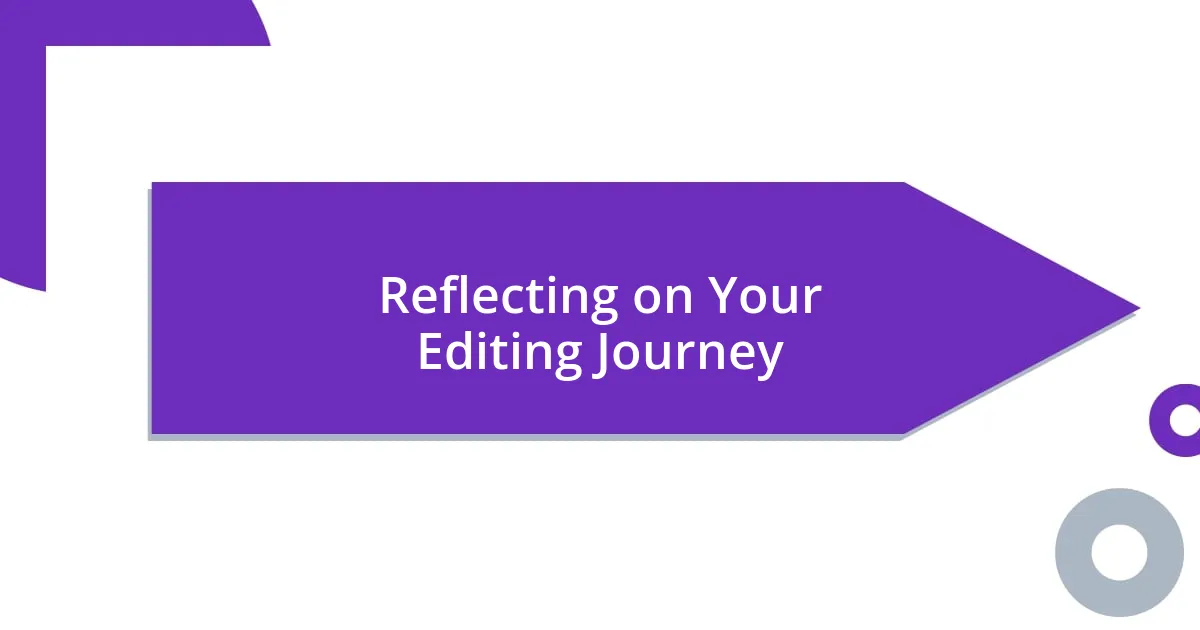
Reflecting on Your Editing Journey
Reflecting on my editing journey brings a mix of emotions—pride, frustration, and an ever-present sense of growth. I vividly recall a particularly grueling round of edits where I felt like I was going in circles. Each day, I would reread the same passages, searching for perfection. In those moments, I often wondered if I was the only one caught in such a loop. But as I stepped back and viewed the bigger picture, I realized that these ebbing waves of doubt were part of a larger process, nudging me toward realizing my creative vision.
Looking back at my earlier drafts, I notice how my voice has matured. It’s almost like uncovering layers of paint from an old canvas, and I remember how thrilling it felt to spot my original intent buried beneath the revisions. Has that sense of discovery ever sparked excitement for you? Recognizing how far I’ve come has taught me that editing is not just about correcting mistakes; it’s a transformative journey revealing the essence of my writing. Each challenge faced has been like a puzzle piece falling into place.
Taking time to reflect has also underscored the importance of patience. There were days when I’d despair over the thought of multiple rounds of edits, thinking, “Will this ever end?” Yet, I gradually learned to appreciate the journey, embracing the twists and turns like an adventure. That shift in mindset made a significant difference. How often do we rush towards completion instead of savoring the depth of the process? By allowing myself to enjoy the unfolding narrative, I found a deeper appreciation for my craft and the storytelling journey, reminding myself that every line I’ve revisited is a step toward creating something truly worthwhile.
